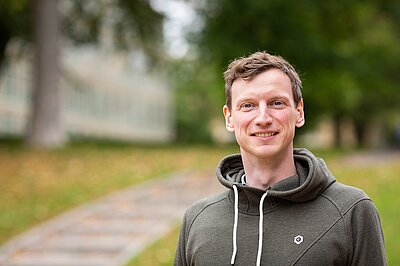Peter Andersen, Former Postdoc
Peter Eber Andersen was a member of the Brennecke group from 2013 to 2019, where he uncovered how animal germline cells, which carry DNA from generation to generation, manage to stay immortal. His research revealed a surprising and unorthodox gene regulation mechanism underlying small RNA-based genome defense in Drosophila. Andersen is now a tenure-track group leader at Aarhus University, in Denmark.
We sat down with Peter to talk about his IMBA journey and how it contributed to his successful scientific career.
Being a postdoc at IMBA gives you a fantastic scientific environment which surrounds you with lots of really smart people and provides access to amazing resources like the Vienna BioCenter Core Facilities. This creates a research opportunity extravaganza to a degree that is found in few places around the world.
My favorite aspects were the scientific freedom as well as feeling that scientific spark when attending lab meetings or the wonderful RNA club seminars. It was great to see that people were excited about and motivated to engage in each other’s research.
A few fellow Vienna BioCenter postdocs and I started a cross-team peer group where we worked to improve our manuscripts and ideas in a critical but informal and very constructive manner. We gave input and feedback on each other’s projects and paper drafts, and it was exciting and very fun to interact with such brilliant, generous and funny people and help each other make our science better.
I learned a lot of things that I apply in my own research group, including the importance of developing presentation skills and the inspiring realization that everyone, regardless of their position, can be a role model you can learn something from.
It takes a delicate balance to build a research environment that is both ambitious, with spark and nerve, and at the same time kind and inclusive. The diversity of research leaders at IMBA and the Vienna BioCenter and their approaches to find this balance was an important eye-opener to me. I realized how different the approaches to building a research group are, and that I needed to find my own path.
For a good while during my postdoc, I was lucky to be part of a fantastic group of people from campus playing badminton every week. One Friday social hour also led to the formation of a band called “Navlefnuller“ - Danish for belly button fluff - with which I rehearsed every week for two years, had immense amounts of fun, and never played a single concert. Altogether, doing a postdoc was about the journey, not the destination.
